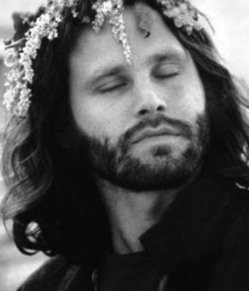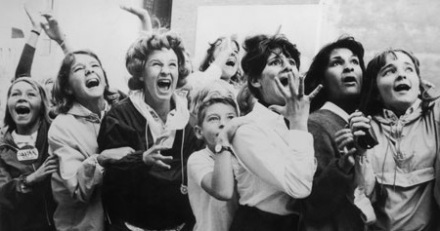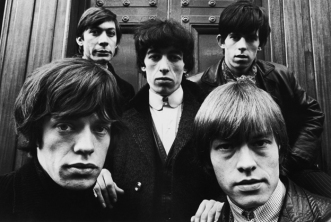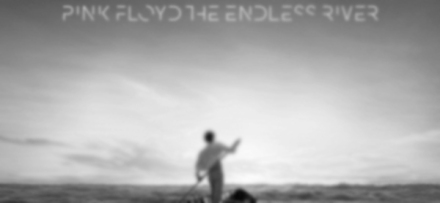The Celebration of the Lizard
 On this day, 8th December, in 1943, Jim Morrison was born. The little boy who would later become the self-entitled Lizard King had a relatively rough childhood, moving from town to town and feeling out of place anywhere he went. The teenager Jim (or Jimbo, as his friends would call him) seemed to be a full-out prankster, always joking fooling around – a period followed by what is now legend.
On this day, 8th December, in 1943, Jim Morrison was born. The little boy who would later become the self-entitled Lizard King had a relatively rough childhood, moving from town to town and feeling out of place anywhere he went. The teenager Jim (or Jimbo, as his friends would call him) seemed to be a full-out prankster, always joking fooling around – a period followed by what is now legend.
Being incredibly well-read and highly intelligent, Morrison’s big dreams and high hopes of finding like-minded people in the beat culture that dominated the era led him to leave home and hitchhike through America and reach the west coast: Los Angeles. Here, it all started and happened for Jim, who started a band on a beach with his good friend Ray Manzarek. Listening to the soulful lyrics when Jim sang ‘Moonlight Drive’ a capella in front of him, they both decided then and there to try to create meaningful music – which they did so well.
Let’s swim to the moon, uh huh
Let’s climb through the tide
Penetrate the evenin’ that the
City sleeps to hide
Let’s swim out tonight, love
It’s our turn to try
Parked beside the ocean
On our moonlight drive
The Appeal of Rockstars
Ah, even the fangirls were better in the ’60s. Strange as it may seem, they have always existed (yep, even Beethoven had women swoon) and will always exist – rockstars seem to touch a sensitive chord in the hearts of women and make them unconditionally love the band. Even if not for the best reasons.
The problem with the kind of fans who faint of sheer excitement and emotion when they meet artists is that they don’t really focus on the music – not really. Everyone knows that a pretty face will sell albums, but that doesn’t mean that the band is good or bad; it just means that its members are attractive. Thus, it doesn’t really say anything about the quality of the music if the band has many fangirls. Sadly, in the case of bands such as The Beatles, when the music is also good, the message seems to be lost somewhere along the lines.

This is what is, to some extent, infuriating even to the artists themselves; it would be only natural that if one loves the music, they would also get attached to the people who produce it, but when it comes to screaming and going in a full out frenzy, the line is crossed. Obviously,the philosophy of each to himself is available: if you want to, you can be a fangirl. By all means. But what needs to be understood is that the music, the message, the art that is indeed created is much more important than one person or another – and that should never be neglected.
Jimi Hendrix – The Modest Genius
 Knowing Jimi (n.b. very limited experience from interviews and his music), I can already imagine him looking down and saying “Noooo….” after reading the title. Seeing how truly immensely talented he was at playing guitar, one would think that he would not be reticent in accepting the level of his skill and taking compliments, but that is not really the case. The legendary guitarist was actually a very shy person and, even though it may be hard to believe, he didn’t consider himself to be such a great guitarist – very modest, kind and calm, he was not what you would expect a star of his scale to be. And that is what makes him so charming.
Knowing Jimi (n.b. very limited experience from interviews and his music), I can already imagine him looking down and saying “Noooo….” after reading the title. Seeing how truly immensely talented he was at playing guitar, one would think that he would not be reticent in accepting the level of his skill and taking compliments, but that is not really the case. The legendary guitarist was actually a very shy person and, even though it may be hard to believe, he didn’t consider himself to be such a great guitarist – very modest, kind and calm, he was not what you would expect a star of his scale to be. And that is what makes him so charming.
Even though it may seem like a funny interview, you can see right away how shy he gets, immediately lowering his head and shifting in his chair. He doesn’t seem to be joking either – but we know better than to trust him. The following video of him playing one of his most well-known songs, “Hey Joe” immediately removes all doubt that he is an incredibly skilled guitarist. Who else have you ever seen playing the instrument with their tongue, or at their back?
Roger Waters The Wall Live – Mindblowing Experience
One thing not many people can boast on is seeing the legend that is Roger Waters performing the legend that is The Wall live – check. I think I can say without being pretentious that was it a life-changing experience not only because of the mindblowing music, but also because of the sense of community in the crowd – but I’ll get into that later.
Firstly, the scene was absolutely incredible: seeing the wall gradually being built throughout the show and then its iconic tearing down, Roger’s singing, the guitar solos, inflatables and overall concept was a little bit too much to handle for a hardcore fan such as myself. The concert was very well thought through, I seriously don’t know how it could have been made better. Every little detail was though of – the lights, the sound, the visuals (simply staggering). Overall, the experience was incredible and more than I could have ever thought it could be.

Now, the crowd. Seriously, I would not exaggerate if I was to say that it was quite an important component that added to the whole concert. Most people were 40+ and you could see in their eyes the excitement of seeing this magnificent piece of music that really meant something to it live. When the iconic album was released, Romania was a communist country and such music was censored – so one could immediately imagine why the experience of seeing this concert would mean a lot to people living in that period.
The Rolling Stones – Panache and Charisma
Mainly a cover band in their beginnings, the Rolling Stones slowly but surely developed into what would later become one of the greatest rock bands of all times. Hits such as “I Can’t Get No Satisfaction”, “Angie” or “Sympathy for the Devil” have that certain something that makes one instantly recognize the fact that the band has what it takes to make history. They didn’t get it right the first time, though – just like any other band, they had to struggle and make their own way through the crowd of similar (but not quite) bands.
Being an aspiring rock star with big dreams and high hopes can, indeed, be disappointing. Not managing to reach your goals can be depressing, as everyone can tell you (we have all failed at one point or another in our lives), but when it is good, it is spectacular. Mick Jagger’s life is something that he probably never would have thought he would achieve – perhaps something even him would not have hoped to get in his wildest dreams. But worldwide recognition and love can certainly not be reached by being discouraged from the start. Just like the Rolling Stones themselves stated: You can make it if you try.
Masterpiece – THE WALL
In the ’60s, the hippie movement was just beginning to take form and the legendary band, Pink Floyd, was developing into what would be, just a few years later, the iconic band of the psychedelic era. After almost two decades, The Wall was created, a music piece which would later become a movie and a legend.
Based here in London in ’63 (two of the longest running members met while studying at the Regent Street Polytechnic – now Westminster University) and iconic for psychedelic rock, Pink Floyd has a legacy which will surely live on for many years – even now, over five decades from their conception as a band, albums like The Dark Side of the Moon or The Wall are still regarded with awe. But what makes Pink Floyd what it is today? Why does the work of Waters, Gilmour, Mason, Wright and, for a too short period of time, Barrett seem so far ahead of the competition? The question is hard to answer, but considering the many political and social ramifications of the music and lyrics written by the members (mostly Roger Waters), a factor contributing to their enormous success must surely be complexity.- however, at the start of the Roger Waters led era in ’78, their iconic album, The Wall, was released. Even when it first appeared, it shocked the public as being symbol laden, containing a narrative which followed little Pink, a boy who struggled through maturity with several issues.
The movie Pink Floyd – The Wall clarifies the idea behind the album; containing parts from the lives of both Roger Waters, who wrote the whole concept album, and Syd Barrett, former band member who had to leave because of his deteriorating mental health, the story of Pink shows him developing from being a frightened boy, scared by the death of his father in the war, to being a wrecked rock star, drug addicted and oppressed by his own thoughts. The story builds until Pink becomes a megalomaniac, having built the metaphorical Wall between him and the outside world – and in the end, after lyrics and scenes full of political innuendos (mostly addressed to fascism and capitalism), the Wall is tore down. Thus, at the end of the epic psychedelic journey, we find that Pink has finally gotten over his mental issues and decided to open himself to the outside world, allowing himself to feel, react, interact – be human.
The album singlehandedly became immensely popular when it was released, but combined with an elaborate live show created especially for it and a movie that emphasised its main points it gained a monumental importance. The materialisation and slow tearing down of the metaphorical wall on the stage, the projections, the inflatable figures (the pig floating above the audience for the whole show, the terrifying teacher), the crashing plane and the wonderful sound of the music itself have made an impact on the audiences and struck each individual as complex and meaningful.
The movie, released in 1982, also combined strong imagery with the great impact of the lyrics; the image of identity stripped children absentmindedly walking into a meat grinder while the words “All in all you’re just another brick in the wall” are sung in a choir surely left an impact on all viewers. The political messages are to be found in every part of the movie – the moment during In The Flesh when Pink suddenly turns fascist and belittles the audience with rude remarks makes a strong statement regarding intolerance: “There’s one in the spotlight, he don’t look right to me, Get him up against the wall. (…) If I had my way, I’d have all of you shot!”
All in all, The Wall is both a musical and a visual masterpiece, a complex intertwining of many platforms, ideas, styles, issues and stories. Attacking problems still relevant to today’s day and age, Pink Floyd’s concept album will surely have a impact on many generations to come.
----------------------------------------------------------------------
The Endless River – Pink Floyd & Its Evolution
The legendary rock band Pink Floyd has surely infiltrated in the lives of each and every one of us – be it by our own choice or simply by chance. “Another Brick in the Wall Pt. II” or “Wish You Were Here” are some of the epic songs which we all know and instinctively start singing along to, even though we do not remember when we heard them for the first time. Their beginnings have by no means been modest – Pink Floyd is, after all, the most well-known rock band of all time – and their last album, The Endless River, which just came out on the 7th November, is no different.
The band formed by Waters (who later left), Gilmour, Mason and Wright (sadly, the latter passed away in 2008) has followed a sinuous path – the dynamics between the members has always been strange, but they managed to balance this situation with the creation of greatly influential and widely appreciated music. The Dark Side of the Moon or The Wall are two of the most well-known rock albums of all times – and some may consider that that is a tough act to follow up in itself. However, Gilmour and Mason, the last two members of Pink Floyd, decided to supersede themselves and create a new album.
Truth be told, it is not a completely new album, containing pieces of music which they wrote up to 20 years ago and often referencing former albums. However, The Endless River does contain some eerie-sounding music, Gilmour’s guitar playing as perfect as ever, but what it seems to be lacking is a concept – which was usually provided, as everybody knows, by Roger Waters. His absence is what seems to haunt the whole album, as lyrics are sparse and not very meaningful and a central theme seems to be missing. Gilmour argues that there is, indeed, a central theme to the album: the music’s continuity and slow build up. Whilst that may be true and their sound is still on point, the greatness of their prior albums which approached certain themes and exploited them to the point of making their listeners have revelations is clearly lacking.
All in all, the latest Pink Floyd album is dangerously close to being just another brick in the wall; it seems to be haunted by the echoes of their former work but looks into the past with a new, calmer perspective. Their cover art – always iconic for Pink Floyd – seems to suggest the same idea; The Endless River does offer some kind of closure, being that it is probably their final act, as Gilmour himself stated that “This is the last thing that’ll be out from us …” The overwhelming feeling that comes over a Pink Floyd fan when listening to it is, undoubtedly, nostalgia for the times when their albums were not only musically pleasing, but also conveyed a strong message.
https://www.rollingstone.com/music/music-lists/500-greatest-songs-of-all-time-151127/
https://www.rollingstone.com/music/music-lists/500-greatest-songs-of-all-time-151127/
credit to Oldrockblog.wordpress.com










